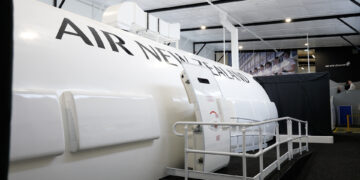FDA warns Cleveland seafood firm about multiple problems
The Food and Drug Administration sends warning letters to entities under its jurisdiction as part of its enforcement activities. Some letters are not posted for public view until weeks or months after they are sent. Business owners have 15 days to respond to FDA warning letters. Warning letters often are not issued until a company has been given months to years to correct problems.
Euro USA Inc.
Cleveland, OH
A seafood processing firm in Ohio is on notice from the U.S. Food and Drug Administration (FDA) for numerous violations of federal regulations.
In a Nov. 22, 2024, warning letter, the FDA described a July 10-25, 2023, inspection of Euro USA Inc.’s seafood processing facility in Cleveland, OH.
FDA investigators found serious violations of the seafood Hazard Analysis and Critical Control Point (HACCP) regulation and the Current Good Manufacturing Practice, Hazard Analysis, and Risk-Based Preventive Controls for Human Food regulation. Failure of a processor of fish or fishery products to have and implement an HACCP plan that complies with regulation renders the fish or fishery products adulterated. Accordingly, the firm’s fish and fishery products are adulterated, in that they have been prepared, packed, or held under insanitary conditions whereby it may have been rendered injurious to health.
After the inspection, the FDA investigator issued a Form FDA-483, Inspectional Observations, listing deviations found at the facility.
Some of the significant violations are as follows:
1. The firm must have a HACCP plan that, at a minimum, lists the critical limits that must be met. A critical limit is defined as “the maximum or minimum value to which a physical, biological, or chemical parameter must be controlled at a critical control point to prevent, eliminate, or reduce to an acceptable level the occurrence of the identified food safety hazard.” However, the firm’s HACCP plans for Combined Molluscan Shellfish that includes their shucked, raw scallops in cans, Pasteurized Crabmeat and Scombroid Fish lists critical limits that are inadequate to control the hazards of Clostridium botulinum, pathogenic growth and toxin formation and histamine formation.
a. At the storage critical control point for their Combined Molluscan Shellfish, which includes reduced oxygen packaged shucked raw scallops in cans, the listed critical limit is “Storage cooler temperature not to exceed (redacted by the FDA). However, a critical limit of (redacted by the FDA) is necessary to control Clostridium botulinum growth and toxin formation
b. At the storage critical control point for their Pasteurized Crabmeat HACCP, the listed critical limit of “Storage cooler temperature should not exceed (redacted by the FDA) for over (redacted by the FDA). However, many of the cooler temperatures exceeded this critical limit in June and July 2023. Most notably, the temperature range was (redacted by the FDA) from July 2-8, 2023. In addition, their critical limit should ensure the products are (redacted by the FDA).
Furthermore, an FDA investigator reviewed their continuous monitoring system (CMS) records for their seafood storage cooler. The CMS data records from May 20 to July 10, 2023, revealed their seafood storage cooler temperatures ranged from (redacted by the FDA) for entire days. Additionally, employees used infrared thermometer (IR) guns to monitor the same storage cooler temperatures and for the same time span, the IR temperature recordings were logged at (redacted by the FDA).
c. The receiving CCP for their Combined Molluscan Shellfish HACCP plan that includes their reduced oxygen packaged shucked raw, scallops in cans, lists a critical limit that fails to ensure the products were held at adequate temperatures continuously during transit to their facility (redacted by the FDA).
d. The receiving CCP for their Scombroid fish HACCP plan, lists a critical limit that is not adequate to control histamine formation. The critical limit indicates they may receive scombroid fish with gel packs. If so, FDA recommends internal temperatures of a representative number of fish be taken at receiving. Their written response indicated that they are revising their HACCP plans to reflect the correct CCP, and seafood staff have been trained on new procedures. FDA finds their response inadequate in that they did not provide evidence/documentation to demonstrate their corrective actions or that employee training was performed.
2. The firm must implement the monitoring procedures and frequency that they have listed in their HACCP plan, to comply. However, their firm did not follow monitoring and verification procedures for their Combined Molluscan Shellfish, Scombroid Fish and Pasteurized Crabmeat HACCP plans. Specifically,
a. The monitoring procedure at the storage critical control point (CCP) for their Scombroid fish lists checking the adequacy of ice “(redacted by the FDA)”. However, their firm operates (redacted by the FDA). According to their Daily Seafood Sanitation Reports on June 3, 6, 13, 17, 18, 20, 24, and 25, 2023 and July 4, 8, and 9, 2023, the adequacy of ice was (redacted by the FDA). On June 11 and July 1-3, 2023, the adequacy of ice was not checked at all. Furthermore, the monitoring procedures don’t include taking the internal temperatures of fish to ensure the critical limit is met. The monitoring procedures don’t require a representative number of containers to be examined and the approximate number of containers in the cooler.
The firm’s written response indicated that their HACCP plans are under review and will be revised. Additionally, their response indicated that employees were trained on proper monitoring procedures; however, a new HACCP plan hasn’t been implemented yet, nor was evidence provided to document employee training was performed. This response is inadequate in that corrective actions have not been taken or implemented. They also failed to offer a timeframe on when these revisions would be completed.
3. The firm must take appropriate corrective actions when a deviation from a critical limit occurs, to comply. However, their corrective actions were not appropriate to control their hazards of pathogenic bacteria growth, toxin formation and Clostridium botulinum toxin formation when their cooler temperatures for the storage of Pasteurized Crabmeat and their shucked shellfish meat deviated from their listed critical limits of “Storage cooler temperature should not exceed (redacted by the FDA) for over (redacted by the FDA)” and “Storage cooler temperature not to exceed (redacted by the FDA)”, respectively.
Furthermore, their trained Seafood HACCP employee reviewed their CMS records that revealed critical limit deviations and failed to evaluate the product or conduct any type of corrective actions.
The firm’s written response indicated that employees were trained on the importance of performing necessary corrective actions; however, they failed to provide evidence that employee training was performed.
4. The firm’s HACCP plans include corrective action plans that are not in accordance with regulation to ensure affected product is not entered into commerce and the cause of the deviation was corrected as required. Specifically,
a. The CCP of cooler storage of fresh shucked shellfish meat for their Combined Molluscan Shellfish and Pasteurized Crabmeat HACCP plans are inadequate to control Clostridium botulinum growth and toxin formation. Their HACCP plans do not list corrective actions on evaluating the cumulative time and the ambient cooler temperature exposures of the affected product, rejecting the lot or diverting to a non-food use.
b. The CCP’s of receiving and Finished Product Storage in the Scombroid Fish HACCP plan are inadequate to control histamine formation. Taking the internal product temperature alone at receiving does not control the hazard. Additionally, waiting until the finished product storage cooler temperature is above (redacted by the FDA) for more than (redacted by the FDA), checking the adequacy of ice and product temperature does not control the hazard. Furthermore, the HACCP plan doesn’t document chilling, holding, rejecting or diverting the lot to non-food use.
The firm’s written response indicated that their HACCP plans are under review. This response is inadequate in that corrective actions have not been taken or implemented. Additionally, they failed to offer a timeframe on when these revisions would be completed.
5. The firm must monitor sanitation conditions and practices during processing with sufficient frequency to ensure compliance with current good manufacturing practice requirements. However, their firm did not monitor for the adequacy of key areas of sanitation (redacted by the FDA) on June 3, 9, 13, 17, 18, 20, 24, 25 and July 4, 8 and 9, 2023. Additionally, they failed to check the adequacy of any key areas of sanitation at all on June 11 and July 1-3, 2023.
The firm’s written response indicated that employees were trained to check and record sanitation conditions and practices (redacted by the FDA) per shift; however, they failed to provide evidence that employee training was performed or adequately completed “Daily Seafood CCP and Sanitation Report” forms.
The full warning letter can be viewed here.
(To sign up for a free subscription to Food Safety News, click here.)















































